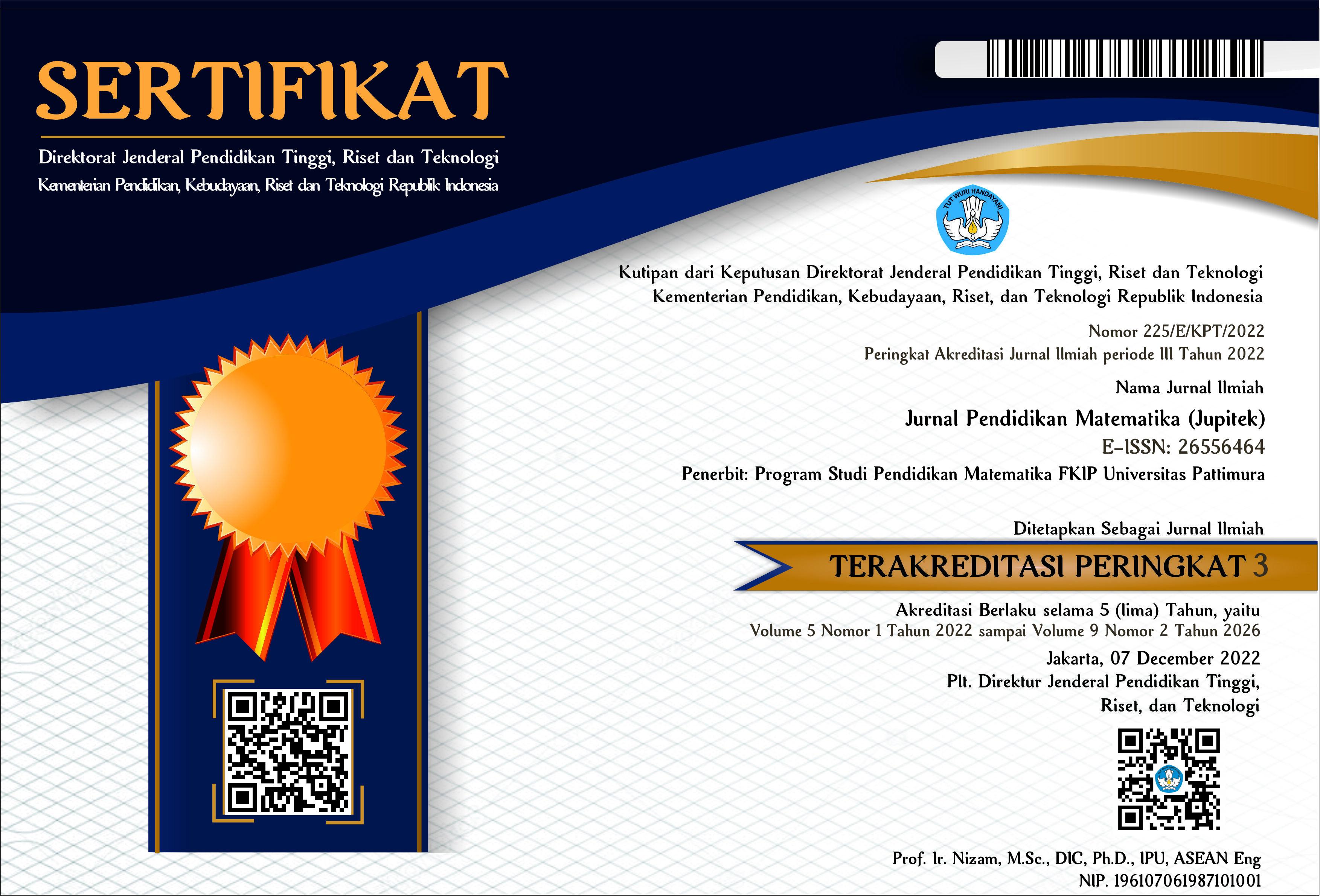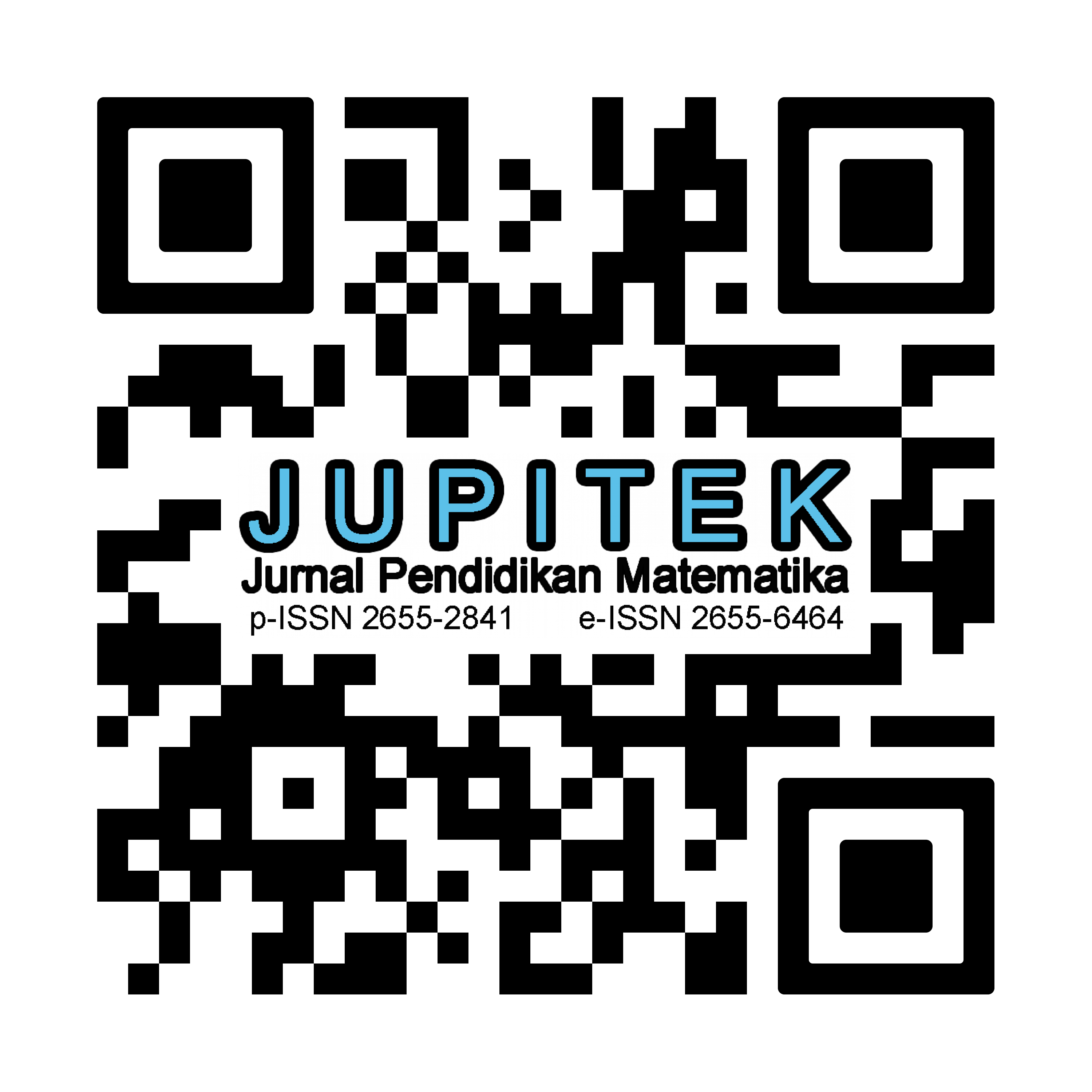PERBEDAAN HASIL BELAJAR SISWA KELAS X SMA MENGGUNAKAN MODEL PEMBELAJARAN KOOPERATIF TIPE STUDENT FACILITATOR AND EXPLAINING (SFE) DAN MODEL PEMBELAJARAN KONVENSIONAL PADA MATERI TRIGONOMETRI
Abstract
This study aims to determine whether there are differences in learning outcomes of class X students of SMA 12 Ambon using cooperative learning model Student Facilitator and Explaining (SFE) and conventional learning models on trigonometric material. The type of research is experimental research (Experimental Research) with the Post-Test Only Control Group Design. The analysis technique is descriptive statistical analysis and inferential test statistics consisting of normality test data, homogeneity test and hypothesis test. The data are processed using SPSS version 20.0. The results of this study are (1) there are differences in learning outcomes using the cooperative learning model Student Facilitator and Explaining and conventional learning models, which shows that the value of t_hitung 3.1128 is greater than the value of t_tabel 2.0003 and the value of Sig. (2-tailed) smaller than the value of alpha 0.05 which is 0.002; (2) learning outcomes of students who use the cooperative learning model Student Facilitator and Explaining type are better when compared to those using conventional learning models
Downloads
References
Andriani, T, Suastika. K, & Sesanti, N. R. (2017). Analisis Kesalahan Konsep Matematika Siswa Dalam Menyelesaikan Soal Trigonometri Kelas X TKJ SMK N 1 Gempol Tahun Pelajaran 2016/2017. Mathematics Education Journal, Vol 1. 35-37.
Jingga. A. A, Mardiyana, & Setiawan, R. (2017). Analisis Kesalahan Siswa Dalam Menyelesaikan Soal Identitas Trigonometri Kelas X Semester 2 SMA Negeri 1 Kartasura Tahun Ajaran 2015/2016. Jurnal Pendidikan Matematika dan Matematika, Vol I. No.5: 54-57.
Kholik. (2011). Pembelajaran Konvensional. http://www.metodepembelajaran. com (diakses tanggal 04 Maret 2019)
Ratumanan, T. G. 2015. Belajar dan Pembelajaran. Yogyakarta: Pensil Komunika.
Ratumanan, T. G & Theresia Laurens. 2016. Analisis Penguasaan Objek Matematika (Kajian pada Lulusan SMA di Provinsi Maluku). Jurnal Pendidikan Matematika Raflesia. Vol. 1 No. 2 Desember 2016.
Ratumanan, T. G., & Christy Matitaputty. 2018. Belajar dan Pembelajaran Matematika. Bandung: Alfabeta.
Ratumanan, T. G., & Carolina S. Ayal. 2018. Problem Solving Based Learning Model Alternative Model of Developing High Order Thinking. International Journal of Health Medicine and Current Research Vol. 3, Issue 02, pp.857-865, June, 2018.
Ratumanan, T. G. 2019. Model Pembelajaran Interaktif dengan Setting Kooperatif (Model PISK). Bandung: Alfabeta.
Rusman. (2011). Model-Model Pembelajaran Mengembangkan Profesionalisme Guru. Jakarta : PT Raja Grafindo Persada
Shoimin, A. (2016). 68 Model Pembelajaran Inovatif dalam Kurikulum 2013. Yogyakarta: Ar-Ruzz Media
Suprijono, A. (2009). Cooperative Learning. Yogyakarta: Pustaka Belajar.
Susanto, A. (2014). Teori Belajar dan Pembelajaran di Sekolah Dasar. Jakarta
Zahra. C, Widyawati. S, & Ningsih, E. F. (2016). Eksperimentasi Model Pembelajaran Kooperatif Tipe Student Facilitator and Explaining (SFE) Berbantuan Alat Peraga Kotak Imajinasi Ditinjau Dari Kecerdasan Spasial. Jurnal Ilmiah Pendidikan Matematika, Vol 2. 97-98
Copyright (c) 2019 Stela Ruhulessin, Tanwey Gerson Ratumanan, Hanisa Tamalene

This work is licensed under a Creative Commons Attribution-NonCommercial-ShareAlike 4.0 International License.
License and Copyright Agreement
By submitting a manuscript to Jurnal Pendidikan Matematika (JUPITEK), the author(s) certify and agree to the following terms:
- Originality and Authority: The submitting author is authorized by all co-authors to enter into this agreement. The manuscript describes original work that has not been published previously in a peer-reviewed journal, nor is it under consideration for publication elsewhere.
- Approval: Its publication has been approved by all author(s) and by the responsible authorities of the institutions where the work was carried out.
- Rights: The authors secure the right to reproduce any material that has already been published or copyrighted elsewhere.
- Licensing and Copyright: Authors retain the copyright to their work.
- License Grant: The authors grant Jurnal Pendidikan Matematika (JUPITEK) the right of first publication, with the work simultaneously licensed under the Creative Commons Attribution-NonCommercial-ShareAlike 4.0 International (CC BY-NC-SA 4.0).
- Self-Archiving: Authors are permitted and encouraged to deposit the published version of their article in institutional repositories, on their personal websites, and other academic platforms, with proper acknowledgment of its initial publication in Jurnal Pendidikan Matematika (JUPITEK).






.png)


